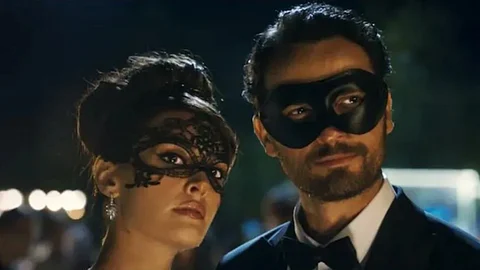The Art of Love Movie Review: Miniscule charm in a mountain of cliché
The Art of Love(2 / 5)
Recai Karagöz’s romantic comedy offers some moments of simplistic charm. But the workable chemistry between the terribly good-looking leads (how could it be any other way, one wonders) and a banal yet sweet premise go only so far in furthering the story. ‘It is what it is’ would be an apt summation of all the goings-on. In The Art of Love, an art thief masquerading as a suave millionaire and an idealistic art student turned Interpol officer (in the art theft section, no less) go head-to-head to outdo each other. And here’s the kicker: They were once in a relationship. How they got into the said professions is never really explained. Nobody really cares. One has to accept things for what they are, which is fantasy. Ask no questions if you know what’s good for you, ignorance is bliss, and so on. Alin (Esra Bilgiç) is ably supported by her partner Ozan (Ushan Çakir), who, in turn, acts as the voice of reason when her quest to catch the elusive Güney (Birkan Sokullu) gets personal. Her Interpol boss warns her about knowing the whole situation from the very beginning. And yet, she is allowed to galivant on the organisation’s dime to apprehend the smooth trickster. She’s obviously not doing any of this luxury vacationing / detective business out of revenge or unresolved feelings, come on! How could they (her superiors and colleague) even think that? Her words and actions, not mine. Poor Ozan seems like a third wheel following her from one museum capital to another (Istanbul, Prague, Paris…place, like Interpol’s budget for the art theft beat, is endless). Once dedicated old Alin infiltrates Güney’s operations in the guise of a gallery owner, unwitting feelings resurface. The latter is so very sorry that he bolted all those years ago, only to leave the former in the lurch.
Director – Recai Karagöz
Cast – Esra Bilgiç, Birkan Sokullu, Fırat Tanış, Ushan Çakir, Nil Keser, Hakan Ummak
When he returns, Alin is gone. No one knows what happened in the interim. The fact we are privy to is that an enigmatic presence has been thieving obscure paintings from museums and galleries across the world, bypassing security systems like you wouldn’t believe. The said presence remains enigmatic for a whole fifteen minutes. Lo and behold, it’s Güney, the millionaire man! To the outside world, he is a wealthy businessman, but to those in the know, he uses all his access and money to obtain works of art by illegal means. He conveniently makes his face visible for Alin to initiate the proceedings of the chase. Kudos to the writers for that gem. If only ascertaining the identities of criminal masterminds were that easy.
In the midst of all this cliché, there is the small matter of chemistry. Something all rom-coms must harness in order to set themselves apart. It’s not just about throwing two gorgeous creatures together now, is it? While they are attractive, in the most conventional sense, there is a commonplace charm to their shared scenes. Especially the ones in which Güney attempts to seek forgiveness for his ‘run for the hills’ folly of the past. The explanation is as predictable as it comes, but the act of holding her hand and looking into her eyes, undeterred, as he spouts this drivel is cute. And she claims she ain’t falling for the ruse (oh yes, she is)…something that’s ever cuter.
Framing the romance within a high-stakes heist isn’t a bad idea, but with the writing so underwhelming, there is little to be salvaged. It appears both lead characters have such impressive powers of conviction that their superiors and team members are mere putty in their hands. No amount of advice will get them to see a sliver of reason. And, to what end, you may ask? To be attached to one another again, of course. As if the last time wasn’t warning enough? But love is blind, or so I’m given to understand. Let’s add dumb to that proverb, shall we? That being said, each to their own. Can’t be judging things you don’t fully comprehend.
The motive behind Güney’s specific brand of art thievery is a genuinely touching story, even if simplistically narrated. Alin’s Mona Lisa-related inspiration from the past falls into the same category. One can only imagine how the actors would have fared with a half-decent script in hand. The first ten or fifteen minutes of the Art of Love begin with promise. As soon as the film passes that line, it chokes on its own mediocrity at blinding speed.


